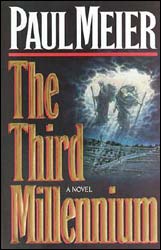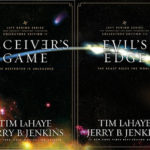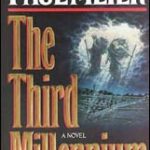Learning From Bad Books, Part 3
The writer had sat down at his computer, frowning slightly, and set about typing, when suddenly a thought occurred to him.
“Have you ever noticed,” he said, out loud, “that in someone’s early writing, there’s a tendency to expound facts or descriptions in dialogue? Here I am, in my chair and frowning slightly, and had just set about typing, when this thought occurred to me even here. I wonder why it is that some writers do that? Do such writers have editors? And do they ever listen to normal conversation?”
But have you ever read something with this kind of dialogue, and it actually got published?
Do not ever, ever, ever “TTM” information
As you know if you’ve read installments one and two in this little series, I’ve read at least one actual novel that flagrantly shoved exposition into dialogue. In fact, for a while I didn’t know what term to give exposition-in-dialogue, so I called it TTM, after the book. It’s a verb, like this:
TTM (tē’tē-ĕm)
v. T·T·Med, T·T·M·ing, T·T·Ms
1. To give flagrant plot exposition or description in dialogue, real or fictitious. I already know where this is and what we’re doing; you don’t need to TTM it.
2. To cause one’s readers to slap dark red marks into their foreheads.
3. To make already-vellum-thin characters sound like dorks. “Look!” Larry brought the binoculars to his eyes. “Troop carriers are littered all over the thirty-mile safety zone. […] The vehicles are upside down and turned over.”
 Other than this particular book, I have not read other stories that commit this, ahhh, unique writing method so directly. And without reading the TTMing in The Third Millennium, I wonder if I would have ever become aware of the problem. So again, that book became a blessing in disguise: I learned something that, as a writer, I might have otherwise fallen into even more.
Other than this particular book, I have not read other stories that commit this, ahhh, unique writing method so directly. And without reading the TTMing in The Third Millennium, I wonder if I would have ever become aware of the problem. So again, that book became a blessing in disguise: I learned something that, as a writer, I might have otherwise fallen into even more.
However, this could make things a bit annoying to a reader. Being aware of the risks of TTMing information, a writer may overcorrect and make things less clear. It’s a tricky balance, and in the best books I’ve read, the writer conveys a description in narrative with enough details to draw the picture in a reader’s mind, without drawing any undue attention to the writing style — or worse, placing the description in unnecessary dialogue. (I’ve heard radio dramas that, without narrators, reworked a novel’s narrative descriptions and not once TTMed the information.)
Yet it’s also occurred to me that a fiction author can info-dump without dialogue. Maybe you’ve seen this in books — a point at which the writer spent far too many words describing a place, or a backstory, that made you need to go back and start over.
This seems a particular risk inherent to fantasy and science fiction: there’s so much that is unfamiliar, and which a writer may feel compelled to over-describe. An author may get quite wrapped up in his or her own created-world, believing that every part of it must be described, even if it doesn’t pertain to the plot. Or he may not want to let all the supporting material about creatures, culture, description or history go to waste. (Yes, J.R.R. Tolkien got away with showing things that didn’t further the plot of The Lord of the Rings. But that’s J.R.R. Tolkien, isn’t it?)
Care for your world: don’t recycle
Other books, even if they avoid unnecessary descriptions in narrative or dialogue, still fall into another trap: overusing the same words.
I’ve been picking on The Third Millennium a lot. So let me try something less controversial — picking on none other than Harry Potter and the Order of the Phoenix.
I’d read this novel a few years ago, but recently I was re-reading it aloud with my wife, Lacy, and we began to discover something: J.K. Rowling was using the word slightly, and using it a lot. And almost every time it seemed more than slightly unnecessary. As we took turns reading the book, we actually began dropping it from narrative descriptions and characters’ dialogue.
Yes, this probably isn’t nearly as annoying if you’re reading silently. But to this day, since we finished re-reading Order some months ago, I’m reluctant to use the word slightly.
Worse, perhaps, is the humbling — and sometimes humiliating — fact that all fiction writers, I’m sure (I hope!) find ourselves using the same words in their own writing. Just now I pulled up an old spreadsheet I put together in summer 2005 for a project, labeled Words to watch for. Seems I was proofreading over a few weeks and grew increasingly annoyed at the terms and phrases I kept seeing — including well and what as dialogue interjections, various conjugations of look, references to to the right of and to the left of, mentions of someone pausing, and (argh, it makes me cringe even now) characters constantly standing up or sitting down, for no reason.
This is when Microsoft Word’s find-and-replace function can be a Godsend.
But for readers of bad books, or even good books with bad parts, we have no choice but to put up with the author’s slips (and that is how I categorize Rowling, of course, knowing her skills). Yet it’s also encouraging to know things could be worse. To support this, again I reference TTM:
[T]o my deep consternation, there was one consternated word that just kept consternatingly popping up out of the pages of the consternated book, like a trap door spider—the consternatingly overused word “consternation”, consternatingly speaking. Every character apparently knows this word and it frequently appears in nearly everyone’s dialogue, along with other unnecessary “big” words that should appear in the narrative more than the characters’ dialogue. It actually consternatingly got to the consternated point that whenever the word “consternation”—or any of its consternatingly related forms—would appear, I would consternatingly cringe.
(Next week: Jumpin’ genres! Notable visionary-fiction fails, often unique to Christian writers, and how we might avoid them.)










































You’re going to make me do a word search on my own manuscript, aren’t you? 😛
Jeff oh so kindly pointed out that I had characters “lurching” all over the place in my original manuscript of Starfire, especially when they stood up.
I also seem to have a facination with words beginning with the letter S when creating Saurian words. Not that I’m biased toward that letter….
I have a tendency to get stuck on a phrase I’ll suddenly develop a fascination with. 0=) And variations of the names Nathaniel and Daniel, for no apparent reason.
For the most part, I won’t notice the adjectives/adverbs too much. I will, however, notice overused exclamation points. After awhile it feels like reading about a pack of hyper cheerleaders. 0=)
I once read that every time you use an exclamation point, you should think “Boing!” It definitely helps cut down on overuse.
Along with overused words (and tics like standing or sitting) are characters who are always being described in the same way or as doing the same things. It’s a very good way to make a character flat. And irritating.
I love it. 0=)
There’s a bigger problem than word overuse with the adverb “slightly.” While all such adverbs should be questioned, using takes the narrative and hijacks it into passive voice. Now, before an apologist comments, passive voice can be used for effect if done intentionally, for effect. Doing so out of ignorance or laziness is cheap and spoils otherwise engaging writing. Trust me: there is nothing worse than reading a harrowing action sequence, like a massive space fight, march against the demon horde, or even domestic feud between characters, only for passive voice to rear its ugly head and sap the energy out of the scene. Trees should not “seem” to lean, an army should not move forward “slightly.” As Yoda wisely advised, “do or do not.”
As with all advise, though, don’t use Word’s find and replace until after you’ve written the scene. Trying to correct this kind of thing in the middle of writing will stall the creative juices to much (at least that’s what I’ve found.) Remember, writing is a process: rewriting and editing being part of that process.
Some good stuff here, Stephen. I love the HP books too but Rowling does overdo the adjectives and adverbs. Also, Order of the Phoenix is an interesting addition to the series but I found the first 200 pages to be mostly unnecessary. Did you feel the same way, as a writer? Finally, I’ve discovered that the HP books hold up a lot better when you read them to yourself. Reading outloud makes the overuse of adjectives and adverbs, very obvious.
Hey, answer me this while we’re on the subject: Was Half-Blood Prince as…Hogwarts High School Musical as the movie? I haven’t read the books, and I felt like I was completely missing something.
Haha! Kaci, you crack me up. The Half-Blood Prince novel is largely about Voldemort’s past, snogging and finding Horcruxes. In the movie, there wasn’t quite as much of an emphasis on Voldemort’s past. The book has more context, the movie shafts some explanations to make way for more snogging. The novel can be seen as a character-study of Harry, his friends and Voldemort, because it’s pretty thin on story. And no, there’s no teen singing. Is that what you were asking?
Yeah. Maybe it’s because even when I was a teen, I would have been a bit annoyed by the excess…snogging. I just has this constant feeling that I was watching something meant for people who’ve read the book. The entire Severus plot felt a bit shortchanged to me.
Sorry Kaci, yes, the entire Severus plot was truncated in comparison to the book, which clears it up better. As for the snogging, yes, it’s not teaching kids the best practices, but I think Rowling wrote it as an exaggeration of the hormonal party young teens go through. I don’t condone casual snogging but I can’t deny that in the context of the book, it wasn’t hilarious.
I knew Severus had to have gotten shortchanged. I wanted a lot more out of it.
The snogging was just…goofy. Out of place.
Methinks you ought to read the book (which I just finished re-reading) and that may help clarify the seemingly excess snogging and what happened with Prof. Snape. Having read the series before seeing the film adaptations, I can’t see how a non-book-reader would have viewed the films! So you probably were watching something meant mostly for book-readers — which is better than, say, certain other fantasy-book adaptations that make far too many changes. …
Reading this series makes me sheepishly realize how useless my reading/commenting on your novel truly was, Stephen. I know bad writing when I read it, (not that yours was!) but I cannot tell you why it is bad. I see that there are terms and explanations for the “badness” beyond what I knew.
So…I guess this is sorry. Slightly. ;P
Ha ha, apology not accepted. 😛 Seriously, some things I read to find and eliminate — including some of the issues outlined in this series — and some things I hope others will find that I may not have caught. For example, a character and his/her motivations may be incredibly vivid in my own imagination, yet the novel may not reveal that as well …
I so appreciate your proofreading, with or without exact diagnoses of the problems. (After all, one can know a car isn’t working and not know exactly why!) So if you shall apologize publicly or a non-offense, I shall just as readily offer non-forgiveness. 🙂
I’m going to comment then go back and read what others have said, so pardon me if I’m repeating someone else’s points or am interrupting an ongoing discussion.
I think the problems you mention, Stephen, can be taken care of if we writers know our characters better. Often things like standing up and sitting down with no reason is because we don’t know what this particular character would do in this particular situation. Same thing with repeated words. If characters all say “what?” in response to shocking news, then maybe we need to do some work individuating them, giving them more personality, distinct personality that would require them to react to the same news in different ways.
I guess I’m saying, we need to be aware of the band-aide approach to editing our work, ignore the temptation to settle for cosmetic surgery, and go all the way to transplanting vital organs if necessary.
Becky
An author may get quite wrapped up in his or her own created-world, believing that every part of it must be described, even if it doesn’t pertain to the plot.
Is this necessarily a bad thing? For me as a reader, it’s often the world in speculative fiction that is more important than the plot. For example, Caves of Steel by Isaac Asimov is, plotwise, a whodunnit. And that’s a good thing. But if you were to ask me why I’d recommend it, the world he builds is the reason – it’s fascinating. Another example is The Borrowers by Mary Norton. The world, and the detailed descriptions of it, are what I like about it – in fact, I’d as soon the plot wasn’t there, as it gets in the way!
[…] of speculative fiction, one of our authors is discussing what a writer can learn from bad books. In Part 3 (see also Part 1 and Part 2), his latest article, he focuses first on authors filling dialogue with […]